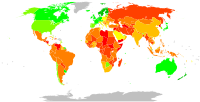
Photo from wikipedia
Abstract Despite corruption’s effects on citizen welfare, there is substantial variation in when citizens are willing to sanction government wrongdoing. This paper uses a conjoint survey experiment, conducted in Uganda,… Click to show full abstract
Abstract Despite corruption’s effects on citizen welfare, there is substantial variation in when citizens are willing to sanction government wrongdoing. This paper uses a conjoint survey experiment, conducted in Uganda, to test how information about the position a corrupt official holds, and the details of an act of embezzlement affect citizens’ perceptions of corruption severity and willingness to punish. I find that the revenue source of stolen funds and the sector to which the funds had been allocated have the largest impact on perceived severity, followed by whether stolen funds are spent privately or recirculated through patronage or clientelism. The position the corrupt official holds has a smaller impact on severity, including whether the official was elected and whether he was a central or local official.
Journal Title: Journal of Experimental Political Science
Year Published: 2019
Link to full text (if available)
Share on Social Media: Sign Up to like & get
recommendations!